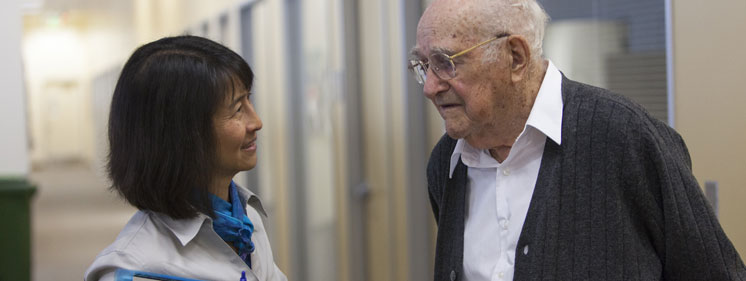Colleagues celebrate Collen’s life and work at American Medical Informatics Association conference in San Francisco Nov. 15
The last published work of Morris F. Collen, MD, one of the original founding doctors of Kaiser Permanente, has been published almost exactly a year after his death at age 100.
Collen worked on the book, an updated volume of his definitive History of Medical Informatics in the United States, virtually until the day he died on Sept. 27, 2014.
“His last words to me were, ‘Make sure that The Book is published,’” said Marion J. Ball, EdD, IBM Research and Professor Emerita, Johns Hopkins University and Collen’s longtime friend, editor and co-author. “It was Morrie’s last wish that this important work be completed.”
The Permanente Medical Group, which contributed support to the book’s publication, and the Kaiser Permanente Northern California Division of Research will honor Collen’s life and the colleagues who helped to complete his final book during the American Medical Informatics Association symposium at the San Francisco Hilton Union Square on Nov. 15.
Collen was widely acknowledged as the Father of Medical Informatics, a pioneer the innovative use of medical data to improve health care.
The History of Medical Informatics in the United States, 2nd Edition (Springer-Verlag London 2015), edited by Collen and Ball, is a meticulously detailed chronological record of significant events in the history of medical informatics and their impact on direct patient care and support services. It updates the first edition, which covered the years of 1970 to 1990, and offers 15 new chapters detailing the transformation medical informatics has undergone up to the present.
After his death, a group of world-renowned scientists joined forces with Ball to bring Collen’s work to press. These recognized leaders in medical informatics — many of whom are recipients of the Morris F. Collen Award of Excellence and were friends of or mentored by Collen — carefully reviewed, edited and updated his draft chapters. Virtually all of the chapter authors will be attending the AMIA conference and two related events in honor of Collen and the book.
In addition to hundreds of journal articles, Collen wrote six books on medical informatics and was honored by the American College of Medical Informatics in 1993 with its first medical informatics medal, named the Morris F. Collen Award in his honor.
A founder of Kaiser Permanente
Collen’s pioneering work in health care informatics followed a long and successful medical career with Kaiser Permanente. An engineer and internist, Collen was one of the first doctors to join Kaiser Permanente in 1942; was one of the seven founding physicians of The Permanente Medical Group in 1948; and served as physician-in-chief in San Francisco from 1953 to 1961.
In 1960, Sidney R. Garfield, MD, founding physician of Kaiser Permanente, asked Collen to attend the Rockefeller Institute’s Conference on Diagnostic Data Processing in New York. “[Dr. Garfield] thought the time had come for doctors to use computers in patient care,” Collen wrote several years ago. “Of course, he was right; and I found this meeting in New York to be very exciting.”
Upon his return, Collen founded the Department of Medical Methods Research — now the Kaiser Permanente Northern California Division of Research — and built a research institution renowned as a trailblazer in drug safety, risk-factor epidemiology, health services and policy, genetics research, and many other areas.
Collen’s early work in the field of health care informatics laid the groundwork for Kaiser Permanente’s HealthConnect, now the largest private patient-centered electronic health system in the world, which securely connects more than 10 million members to 16,000 physicians in almost 600 medical offices and 38 hospitals.
“Now everybody has a personal health record,” Collen reflected on the occasion of his 100th birthday. “The technology has kept advancing. Our first computer took up a whole room. Now your smart phone has got everything that we had on the IBM 1440.
“You can go on your smart phone and pull up your Kaiser record! It’s fantastic! I can hardly believe it.”





This Post Has 0 Comments